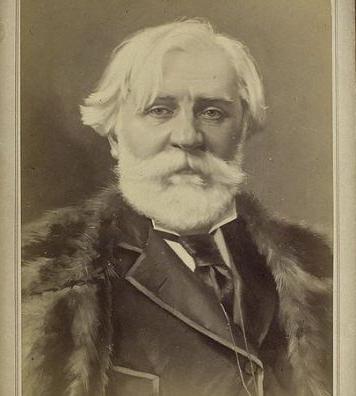What are the sources of literary and any other creativity? What driving forces make an artist create? According to the laws of dialectics, such forces are all kinds of contradictions, most often hidden in the depths of the process. Let us take a closer look at the well-known writer from the school curriculum. What interesting facts from Turgenev’s life can we discover?
What do we know about the author of "Mumu" and "Noble Nest"?
The work of Ivan Sergeyevich Turgenev is an integral part of the classical heritage of Russian literature of the nineteenth century. His books continue to shape the consciousness of Russian people for the past two centuries. The writer's ideas continue to be relevant, and his artistic images do not lose their expressiveness at the beginning of the twenty-first century. And conflicting facts from the life of Turgenev attracted the attention of not only researchers of his work, but ordinary readers of his novels and novels. And in the life of the writer there were many interesting events and conflicting circumstances.
Biography Facts
If you describe Turgenev’s life briefly, the following strange circumstance is striking in the first place - the writer who loved Russian nature wholeheartedly preferred to spend years of his life as far from Russia as possible. Maybe it was easier for him to compose lengthy descriptions of Russian forests, fields, villages and estates from a great distance? Inspiration is a whimsical thing ... But in reality, everything was much more prosaic. Having a good inheritance and a steady income from estates, the writer was much more comfortable feeling outside the homeland. The aristocratic elite of Russia readily read Turgenev. That's just the political views he could not share. All the most interesting facts from Turgenev’s life are somehow related to his worldview. Here he was such a strange landowner-serf.
Aristocrat nobleman
The great Russian literature owed the landowner to the fact that he was one of the first writers who drew attention to the life, way of life and mores of the common people. Before Turgenev's Notes of the Hunter, this was not in fashion. The very name of this series of stories was invented by the editor of the journal Sovremennik Panaev, in order to somehow justify before the reader a little of the unusual circle of themes and images that he will get to know on the pages of this book. Interesting facts from Turgenev’s life begin on its pages, where the author of the story is easily recognized by the storyteller’s image. And the landowner-nobleman with deep sympathy and attention refers to the difficult fate of ordinary Russian men, serfs. And this is far from the most interesting of Turgenev’s life. The writer was not limited to simple oppressed sympathy. He did everything in his power to change the existing order of things in Russia.
Abroad
Perhaps the best years of Turgenev’s life passed in France. He was readily accepted in the highest aristocratic circles and bohemian salons of Paris. His books were translated, published, and read throughout enlightened Europe. The writer traveled a lot, loved to be on the Cote d'Azur in France, in Italy. Often, he accompanied, as an honorary escort, the tour of the famous French singer Polina Viardot, his lover. Such interesting facts from Turgenev’s life as his frequent visits to the gaming houses and casinos of Baden-Baden and Monte Carlo did not go unnoticed. The Russian writer was a rare gambler, and he didn’t really need any money. But with all this, it was not love for loose life that kept him in Europe for a long time. Staying away from the homeland was mainly due to the writer’s way of thinking, which to a certain extent contradicted what was accepted in the ruling circles of the Russian Empire.
New people of Turgenev
Of course, the writer was not alone in his aspirations. He personified with his creativity the growing momentum of the flow of social thought. Wherever the years of Turgenev’s life passed, his books were aimed at gradually approaching the inevitable socio-political changes in Russia. In addition to serfs, he brought out in his works an entire gallery of such types that previously simply did not exist in Russian literature. But they appeared in the mid-nineteenth century in Russian society and naturally reflected on the pages of Turgenev’s novels and short stories. We are talking about commoners-revolutionaries. About people who were categorically not satisfied with the way of life of Russia that has developed over the centuries. About those who painfully searched for ways to change the existing order of things. You can argue for a long time about the author’s attitude to these new heroes, it is far from unambiguous. But the realist writer immortalized their spiritual quests in his books. And today it would be very difficult for us to understand that pre-revolutionary era without them.

A country on the verge of great change
The writer managed to leave this world long before Russia was swept by a whirlwind of wars and revolutions. And today we can only guess how the Russian classic would react to what happened in the country half a century after the abolition of serfdom. But the realist writer Turgenev has always been at the forefront of public debate and in his works could not but reflect the premonition of big changes. Through his books, revolutionary ideas and moods reached the consciousness of an entire generation of Russian people. There was not a single future revolutionary who was not familiar with his work.